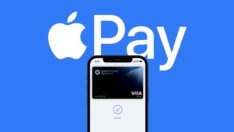Apple joins the ‘buy now, pay later’ race with new interest-free feature
Apple has today launched Apple Pay Later, a buy-now-pay-later service with no interest fees, in partnership with Goldman Sachs Group, who will be lending the funds for the installment offering loans.
The service has been announced as part of iOS 16, alongside a suite of new updates including a personalised lock screen gallery, ‘Focus’, iCloud shared photo library, deeper CarPlay integration, live text, order tracking and more.


